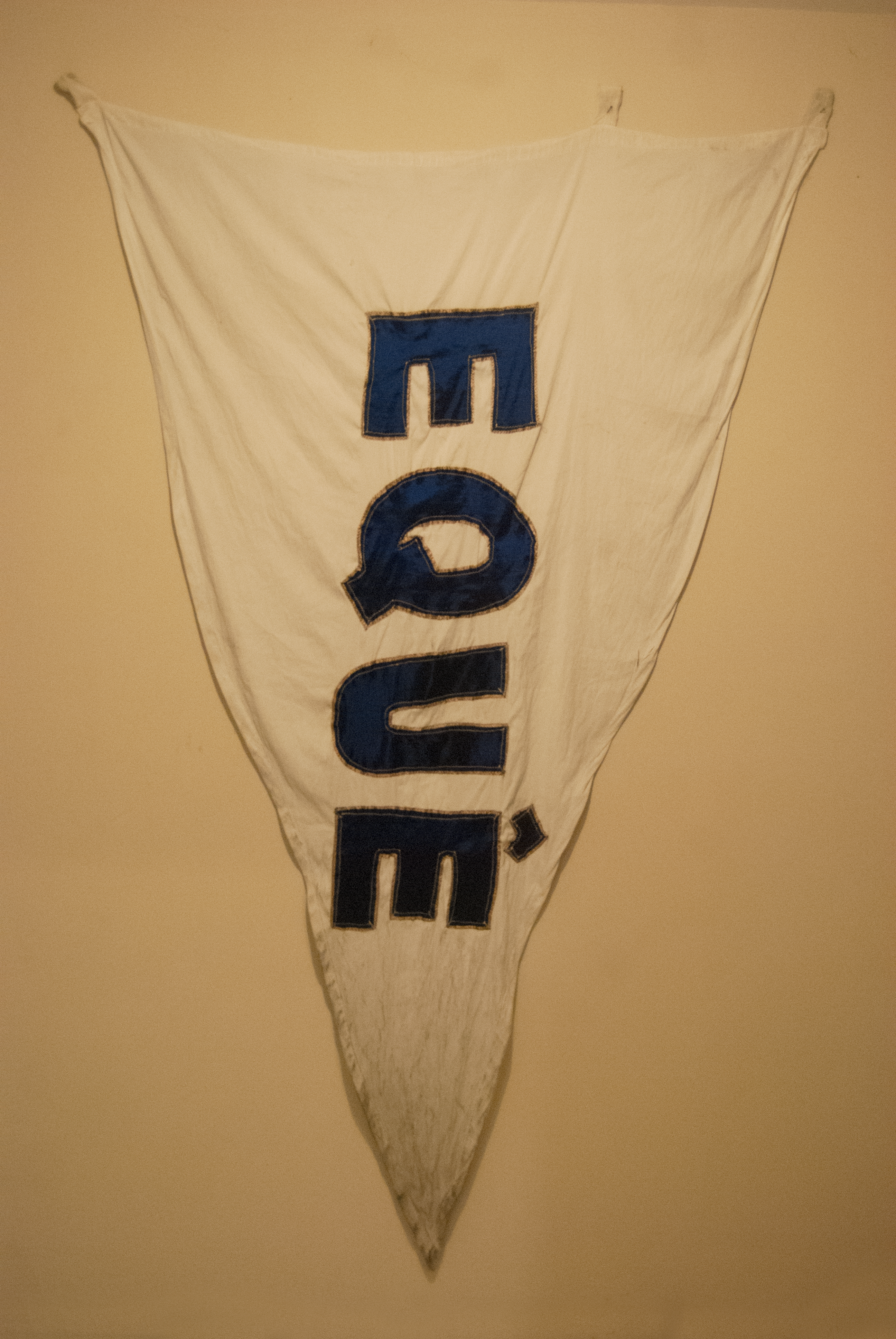EQUÊ - 2017
bandeira de algodão e letras em tafetá
2,40 x 1,47 cm
2018
EQUÊ vem do Iorubá Èké - pessoa ou conversa mentirosa, falsa, fraudulenta. No universo da umbanda e candomblé equê de santo, é aquela pessoa que passa alguém para trás usando de má-fé.
Na comunidade LGBTQI+, o pajubá é a linguagem da rua que as travestis e mulheres trans levam como herança do povo preto para as ruas.É um dialeto que antes era restrito ao grupo mas hoje torna-se cada vez mais popular. Na comunidade a palavra equê traz um sentido próximo ao do terreiro, que é o de passar alguém para trás, de bicha mentirosa, equêzera, é uma das palavras que demonstram o nó simbólico que estes dois grupos têm em comum, enquanto manifestações de afeto, resistência e luta, são percursos da língua e do corpo, que atravessam o tempo e o espaço.
Mais do que dar destaque a palavra e a cultura LGBTQI+ interseccionada pela cultura do povo preto, este trabalho pretende também tensionar a cidade e os fluxos do interior para a capital como grandes armadilhas, pesquisa que se relaciona com o projeto jacarecangoscópio que investiga o surto de varíola no ceará em 1978 e ossadas da época encontradas em 1994.
A Cidade, afinal quem pode vivê-la ou usufruí-la? Quais são os espaços possíveis ao corpo racializado e viado, nesta e em qualquer cidade do mundo? Podemos nos “apropriar” dos espaços que são nossos por direito ou reinventar a cidade?
A cidade pulsa em vida e resistência mas acaba moendo como uma grande forrageira os corpos e as vidas. Após alguns anos em Fortaleza, toma conta do meu corpo uma estranha sensação de retorno a minha cidade natal, de retornar ao “interior”, de ter percebido que na capital tive grandes encontros, mas também me perdi. E tudo é caminho e vida. As amigas do coletivo chá das cinco, também de Icó, estavam passando por Fortaleza e resolvi convidá-las para fincar a bandeira e compartilhar desta energia.
A bandeira foi fincada nos esgotos do bairro jacarecanga, ignorando e ironizando as belas paisagens de Fortaleza.
EQUÊ comes from the Yorubá Èké - a person, or a lying, false, fraudulent conversation. In the universe of umbanda and candomblé equê de santo, it is that person who passes someone back using bad faith.
In the LGBTQI + community, pajubá is the language of the street that transvestites and trans women take as a heritage from the black people to the streets. It is a dialect that was previously restricted to the group but today is becoming increasingly popular. In the community, the word equê brings a sense close to that of the terreiro, which is to pass someone behind, of lying queer, equêzera, is one of the words that demonstrate the symbolic knot that these two groups have in common, as expressions of affection, resistance and struggle, are paths of the tongue and the body, which traverse time and space.
More than highlighting the word and the LGBTQI + culture intersected by the culture of the black people, this work also intends to tension the city and the flows from the interior to the capital as big traps, a research that is related to the jacarecangoscope project that investigates the outbreak of smallpox in Ceará in 1978 and bones of the time found in 1994.
The City, after all, who can live it or enjoy it? What are the possible spaces for the racialized and gay body, in this and any city in the world? Can we “appropriate” the spaces that are rightfully ours or reinvent the city?
The city pulsates with life and resistance but ends up grinding bodies and lives like a great forage. After a few years in Fortaleza, a strange sensation of returning to my hometown takes over my body, of returning to the “interior”, of having realized that in the capital I had great meetings, but I also got lost. And everything is path and life. The friends of the collective tea at five, also from Icó, were passing through Fortaleza and I decided to invite them to plant the flag and share this energy.
The flag was planted in the sewers of the Jacarecanga neighborhood, ignoring and mocking the beautiful landscapes of Fortaleza.

cotton flag and letters in taffeta
voltar
<----